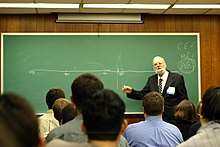
Lecture for the Foundation for Economic Education on July 28, 2006
Israel Meir Kirzner (also Yisroel Mayer Kirzner; born February 13, 1930) is an American economist.
Quotes
- A piece of knowledge about boat-building, about whose correctness Crusoe has no doubts at all, will not be seen as a hunch and will be valued according to Menger's Law. It may be said that Crusoe is well aware that he possesses this kind of information; he will deploy and value it in the same way as he may be imagined to deploy and value other resources he believes are definitely at his disposal. But concerning Crusoe's hunches and his visions in the face of a changing, uncertain environment, it cannot be said at all that Crusoe knows he has a hunch or a vision of the future. He does not act by deliberately utilizing his hunch about the future; instead, he finds that his actions reflect his hunches...In other words, it turns out, the essence of entrepreneurial vision, and what sets it apart from knowledge as a resource, is reflected in Crusoe's lack of self-consciousness concerning it...Crusoe may...gradually come to be aware of his vision. When he does, that vision ceases to be entrepreneurial and comes to be a resource. Moreover, Crusoe's realization that he possesses this definite information resource may itself be entrepreneurial. As soon as he 'knows' that he possesses an item of knowledge,that item ceases to correspond to entrepreneurial vision; instead, as with all resources, it is Crusoe's belief that he has the resources at his disposal that may now constitute his entrepreneurial hunch.
- Israel Kirzner, (1979: 168-169); as cited in: "Israel Kirzner's Entrepreneurship" by the Constitution Society, May 31, 2004
Quotes about Kirzner
- Humanity’s ability to communicate is becoming vastly greater. Knowledge and information are exploding. The greater shared understanding of the world that humanity is coming to possess should result, as the contemporary Austrian economist Israel Kirzner has emphasized theoretically, in circumstances in which an individual’s predictions of the future become more and more accurate. From an Austrian perspective, this should lead to greater economic prosperity.
- Alan Ebenstein, Hayek's Journey: The Mind of Friedrich Hayek (2003), "Introduction".
External links
This article is issued from
Wikiquote.
The text is licensed under Creative
Commons - Attribution - Sharealike.
Additional terms may apply for the media files.